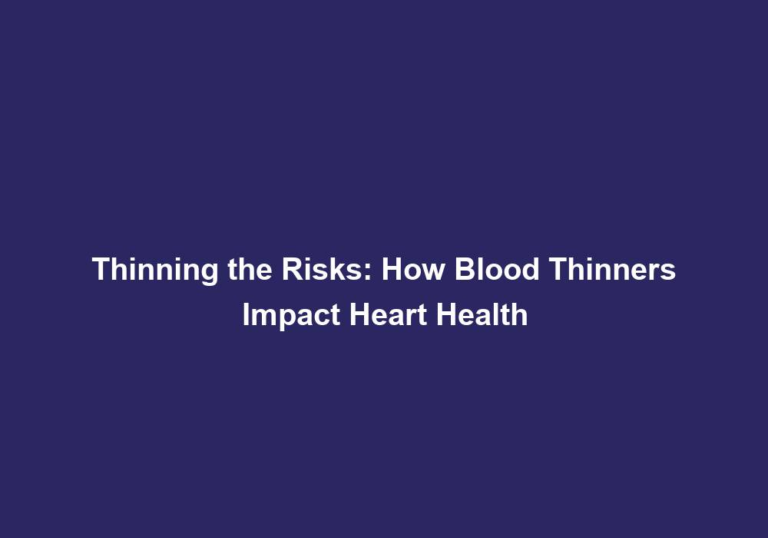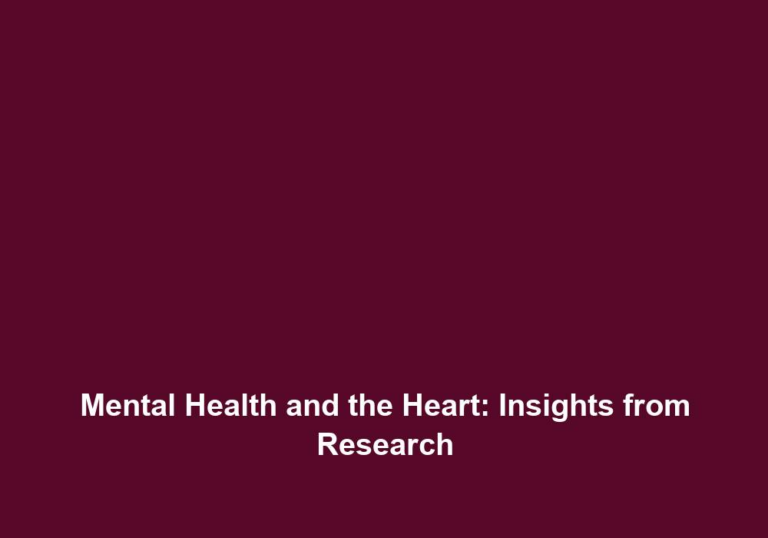Statins and Your Heart: The Breakthrough Pill
Statins have been hailed as a breakthrough pill in the field of cardiovascular health. These medications have garnered considerable attention due to their effectiveness in reducing cholesterol levels and preventing cardiovascular diseases. In this article, we will explore the benefits, mechanisms, and potential side effects of statins to provide a comprehensive understanding of their impact on heart health.
The Role of Cholesterol in Heart Disease
Before delving into the specifics of statins, it is crucial to understand the role of cholesterol in heart disease. Cholesterol is a waxy substance produced by the liver and obtained through diet. It is an essential component of cell membranes and serves as a precursor for the synthesis of certain hormones.
However, when our cholesterol levels become elevated, it can lead to the formation of plaques in the arteries. These plaques can narrow the blood vessels, restrict blood flow, and ultimately result in serious cardiovascular conditions, such as heart attacks and strokes.
Elevated cholesterol levels can be influenced by various factors, including genetics, diet, and lifestyle choices. High levels of LDL (low-density lipoprotein) cholesterol, commonly known as “bad” cholesterol, are particularly problematic as they contribute to the formation of arterial plaques. On the other hand, HDL (high-density lipoprotein) cholesterol, often referred to as “good” cholesterol, helps remove excess cholesterol from the bloodstream.
Understanding Statins
Statins, also known as HMG-CoA reductase inhibitors, are a class of medications primarily used to lower cholesterol levels in the blood. By inhibiting the enzyme HMG-CoA reductase, which plays a key role in cholesterol synthesis, statins effectively reduce the production of cholesterol in the liver.
Apart from lowering cholesterol, statins also offer additional benefits that contribute to heart health. These include reducing inflammation, improving endothelial function, and stabilizing plaques in the arteries. As a result, statins have gained popularity as a preventive measure against cardiovascular diseases.
Statins work by blocking the action of HMG-CoA reductase, an enzyme involved in the production of cholesterol in the liver. By inhibiting this enzyme, statins decrease the amount of cholesterol synthesized in the body, leading to lower levels of LDL cholesterol in the bloodstream. This reduction in LDL cholesterol helps prevent the formation of arterial plaques and reduces the risk of heart disease.
In addition to their cholesterol-lowering effects, statins have been found to have anti-inflammatory properties. Chronic inflammation plays a significant role in the development and progression of atherosclerosis, which is the underlying cause of heart disease. By reducing inflammation in the blood vessels, statins contribute to the overall health and function of the cardiovascular system.
Furthermore, statins have been shown to improve endothelial function. The endothelium is the inner lining of blood vessels, and endothelial dysfunction is a hallmark of cardiovascular disease. Statins promote the release of nitric oxide, a molecule that helps dilate blood vessels and improve blood flow. This improvement in endothelial function reduces the risk of vascular complications and enhances overall cardiovascular health.
Lastly, statins help stabilize vulnerable plaques in the arteries. Vulnerable plaques are prone to rupture, which can lead to the formation of blood clots and potentially result in heart attacks or strokes. By stabilizing these plaques, statins reduce the risk of plaque rupture and the subsequent development of life-threatening cardiovascular events.
Benefits of Statins
-
Cholesterol Reduction: The primary benefit of statins is their ability to lower LDL cholesterol, often referred to as bad cholesterol. By reducing LDL levels, statins help to prevent the buildup of plaques in the arteries, reducing the risk of heart disease.
- Statins effectively lower LDL cholesterol levels by inhibiting the production of cholesterol in the liver.
- Lowering LDL cholesterol decreases the formation of arterial plaques, promoting better heart health.
-
Reduced Cardiovascular Events: Numerous studies have demonstrated that statins can significantly reduce the incidence of cardiovascular events, such as heart attacks and strokes. These medications have been shown to benefit both individuals with existing heart disease and those at high risk of developing it.
- Statins have been proven to reduce the risk of heart attacks, strokes, and other cardiovascular events by lowering LDL cholesterol levels.
- The risk reduction applies to individuals with existing heart disease as well as those with risk factors for developing heart disease.
-
Anti-Inflammatory Effects: In addition to their cholesterol-lowering abilities, statins have anti-inflammatory properties. Chronic inflammation plays a crucial role in the development and progression of atherosclerosis, the underlying cause of heart disease. By reducing inflammation, statins contribute to the overall health and function of the cardiovascular system.
- Statins help reduce inflammation in the blood vessels, which is beneficial for individuals with cardiovascular disease.
- By targeting inflammation, statins provide an additional layer of protection against heart disease.
-
Improved Endothelial Function: Endothelial dysfunction is a hallmark of cardiovascular disease. Statins have been shown to improve endothelial function, promoting healthy blood vessel dilation and reducing the risk of vascular complications.
- Statins promote the release of nitric oxide, which helps dilate blood vessels and improve endothelial function.
- Improved endothelial function contributes to better blood flow and reduces the risk of vascular complications.
-
Stabilization of Arterial Plaques: Statins help stabilize vulnerable plaques in the arteries, making them less prone to rupture. Ruptured plaques can lead to the formation of blood clots, causing blockages and potentially fatal cardiovascular events. By reducing plaque instability, statins can prevent these dangerous complications.
- Statins play a crucial role in stabilizing arterial plaques, reducing the risk of plaque rupture and subsequent cardiovascular events.
- Stabilized plaques are less likely to cause blood clots, promoting better overall heart health.
Potential Side Effects of Statins
While statins offer significant benefits in terms of heart health, it is essential to be aware of potential side effects. It is worth noting that most individuals tolerate statins well, and severe side effects are relatively rare. However, some common side effects include:
-
Muscle Pain: Statins can occasionally cause muscle pain or weakness, known as myalgia. In rare cases, they may lead to a more severe condition called rhabdomyolysis, which involves muscle breakdown and can cause kidney damage.
- Myalgia, or muscle pain, is a common side effect of statins, but it is usually mild and temporary.
- Rhabdomyolysis, a severe condition involving muscle breakdown, is rare but can occur with statin use.
-
Liver Damage: Although rare, statins can potentially cause liver damage. Regular liver function tests are typically recommended for individuals taking statins to monitor any abnormalities.
- Statins have the potential to cause liver damage, but this side effect is rare and usually reversible.
- Regular liver function tests are essential to detect any potential abnormalities early.
-
Digestive Issues: Some people may experience digestive problems, such as nausea, diarrhea, or constipation, when taking statins. These side effects are usually mild and temporary.
- Digestive issues, such as nausea, diarrhea, or constipation, can occur as a side effect of statins, but they are generally mild and transient.
- If these side effects persist or worsen, it is important to consult a healthcare professional.
-
Increased Blood Sugar Levels: In rare cases, statins may lead to a slight increase in blood sugar levels, which can be problematic for individuals with diabetes or prediabetes. Regular monitoring is crucial for such individuals.
- Statins may cause a slight increase in blood sugar levels, but this side effect is rare and usually of concern for individuals with diabetes or prediabetes.
- Regular monitoring of blood sugar levels is important for individuals at risk.
Conclusion
Statins have revolutionized the field of cardiovascular medicine, providing an effective and widely accessible tool for reducing cholesterol levels and preventing heart disease. These medications offer a range of benefits, including cholesterol reduction, reduced cardiovascular events, anti-inflammatory effects, improved endothelial function, and stabilization of arterial plaques.
While statins are generally well-tolerated, it is important to be aware of potential side effects. Regular monitoring and open communication with your healthcare provider can help address any concerns and ensure that statin therapy is safe and beneficial for your specific situation.
By understanding the role of statins and their impact on heart health, individuals can make informed decisions about their cardiovascular well-being. It is essential to consult with a healthcare professional before initiating or altering any medication regimen, as they can provide personalized guidance based on your unique medical history and risk factors.
The content of this article is for informational purposes only and should not be considered as medical advice. Always consult with a healthcare professional before starting any treatment or medication.







